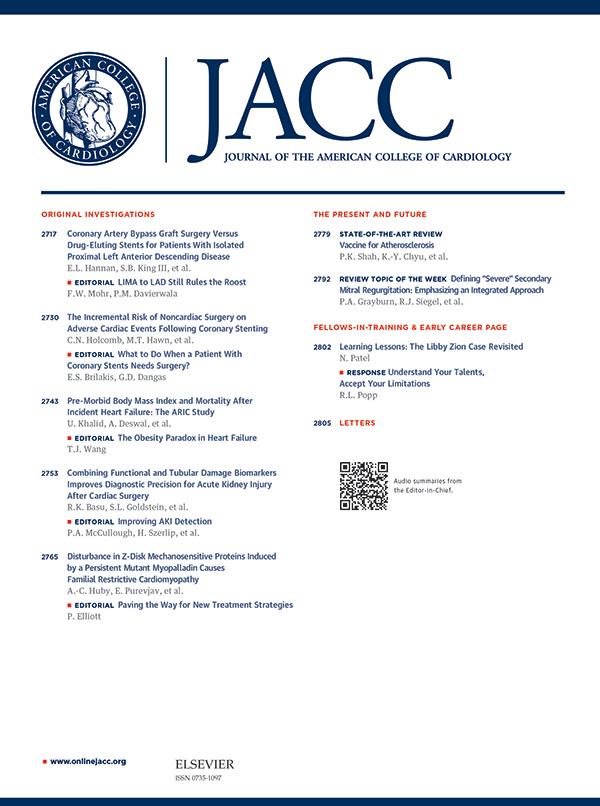Predicting Heart Failure Outcomes Using Patient-Reported Health Status
IF 21.7
1区 医学
Q1 CARDIAC & CARDIOVASCULAR SYSTEMS
引用次数: 0
Abstract
Background
The Kansas City Cardiomyopathy Questionnaire-12 (KCCQ-12), a patient-reported outcome measure for adults with heart failure, is associated with hospitalizations and mortality in clinical trials. Curated data sets from controlled trials differ substantially from pragmatic data collected from real-world settings, however, and few data exist on the KCCQ-12's predictive utility in clinical practice.
Objectives
This study sought to evaluate the predictive utility of the KCCQ-12 for hospitalizations and mortality when administered during outpatient heart failure care.
Methods
We conducted a cohort study of patients assigned the KCCQ-12 in heart failure clinics from July 2019 through March 2024. The primary exposure was KCCQ-12 Overall Summary (KCCQ-OS) score. The primary outcomes were 90-day hospitalization and cumulative mortality. Multivariable-adjusted associations were assessed using logistic regression and Cox proportional hazards models. Gradient boosting (XGBoost) and random survival forest machine learning models were used to evaluate KCCQ-OS feature importance in predicting 90-day hospitalizations and cumulative mortality, respectively.
Results
Among 4,406 patients assigned the KCCQ-12, 2,888 (66%) completed at least 1 questionnaire. The median KCCQ-OS score was 59.4 (Q1-Q3: 35.4-81.8). Patients with KCCQ-OS scores <25 had higher adjusted risks of 90-day hospitalization (OR: 3.49; 95% CI: 2.50-4.90) and cumulative mortality (HR: 3.09; 95% CI: 2.29-4.17) compared with those with scores ≥75. The KCCQ-OS score was the most important feature for predicting 90-day hospitalizations in the XGBoost model (area under the receiver-operating characteristic curve: 0.760; 95% CI: 0.706-0.811) and the most important feature for predicting cumulative mortality in the random survival forest model (C-index 0.783; 95% CI: 0.742-0.824) compared with other clinical, demographic, and laboratory variables. KCCQ-12 noncompletion was independently associated with increased 90-day hospitalization (OR: 1.72; 95% CI: 1.46-2.02) and 1-year mortality (HR: 1.52; 95% CI: 1.25-1.84) after adjusting for all variables in the primary analysis.
Conclusions
In outpatient heart failure care, lower KCCQ-OS scores were strongly associated with increased hospitalizations and mortality, with the greatest risk among patients with scores <25. Noncompletion of the KCCQ-12 was itself associated with worse outcomes. The KCCQ-OS score was the dominant predictor of 90-day hospitalizations and cumulative mortality in machine learning models, supporting the KCCQ-12 as a prognostic tool in routine clinical practice.

使用患者报告的健康状况预测心力衰竭结局:KCCQ-12的真实世界验证
堪萨斯城心肌病调查问卷-12 (KCCQ-12)是一项针对成人心力衰竭患者报告的结果测量,在临床试验中与住院率和死亡率相关。然而,来自对照试验的整理数据集与从现实环境中收集的实际数据存在很大差异,并且很少有数据表明KCCQ-12在临床实践中的预测效用。目的:本研究旨在评估KCCQ-12在门诊心力衰竭治疗期间对住院率和死亡率的预测效用。方法:我们对2019年7月至2024年3月心力衰竭诊所的KCCQ-12患者进行了一项队列研究。主要暴露为KCCQ-12 Overall Summary (KCCQ-OS)评分。主要结局是90天住院和累计死亡率。采用logistic回归和Cox比例风险模型评估多变量校正相关性。使用梯度增强(XGBoost)和随机生存森林机器学习模型分别评估KCCQ-OS特征在预测90天住院和累积死亡率方面的重要性。结果在4406例KCCQ-12患者中,2888例(66%)完成了至少1份问卷。KCCQ-OS评分中位数为59.4 (Q1-Q3: 35.4-81.8)。KCCQ-OS评分<;25的患者90天住院调整风险较高(OR: 3.49;95% CI: 2.50-4.90)和累积死亡率(HR: 3.09;95% CI: 2.29-4.17)与评分≥75的患者相比。在XGBoost模型中,KCCQ-OS评分是预测90天住院的最重要特征(接受者-工作特征曲线下面积:0.760;95% CI: 0.706-0.811)和预测随机生存森林模型累积死亡率的最重要特征(C-index 0.783;95% CI: 0.742-0.824),与其他临床、人口统计学和实验室变量进行比较。KCCQ-12未完成与90天住院时间增加独立相关(OR: 1.72;95% CI: 1.46-2.02)和1年死亡率(HR: 1.52;95% CI: 1.25-1.84)。结论在门诊心衰护理中,KCCQ-OS评分较低与住院率和死亡率增加密切相关,且得分较高的患者风险最大[lt;25]。未完成KCCQ-12本身与较差的结果相关。在机器学习模型中,KCCQ-OS评分是90天住院和累积死亡率的主要预测指标,支持KCCQ-12作为常规临床实践中的预后工具。
本文章由计算机程序翻译,如有差异,请以英文原文为准。
求助全文
约1分钟内获得全文
求助全文
来源期刊
CiteScore
42.70
自引率
3.30%
发文量
5097
审稿时长
2-4 weeks
期刊介绍:
The Journal of the American College of Cardiology (JACC) publishes peer-reviewed articles highlighting all aspects of cardiovascular disease, including original clinical studies, experimental investigations with clear clinical relevance, state-of-the-art papers and viewpoints.
Content Profile:
-Original Investigations
-JACC State-of-the-Art Reviews
-JACC Review Topics of the Week
-Guidelines & Clinical Documents
-JACC Guideline Comparisons
-JACC Scientific Expert Panels
-Cardiovascular Medicine & Society
-Editorial Comments (accompanying every Original Investigation)
-Research Letters
-Fellows-in-Training/Early Career Professional Pages
-Editor’s Pages from the Editor-in-Chief or other invited thought leaders

 求助内容:
求助内容: 应助结果提醒方式:
应助结果提醒方式:


